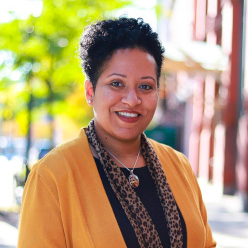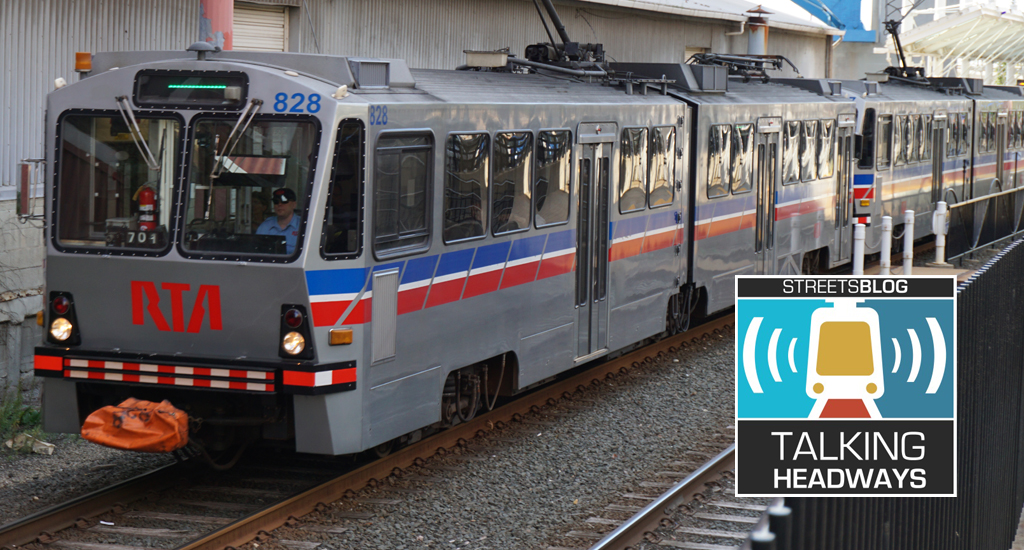This week's episode is a one-on-one conversation between Billy Terry, Executive Director of the National Transit Institute at Rutgers University, and India Birdsong Terry, General Manager and CEO of the Greater Cleveland Regional Transit Authority. They discuss leadership, hiring and culture change at Ohio's largest transit agency.
Scroll down for an edited snippet of their conversation — and click here for an unedited, AI-generated transcript of the entire episode.
Billy Terry: You talked a lot about the assets of RTA to serve the community and let me just throw a curve ball in here, India. I would submit your greatest asset is your human capital of RTA. Let's just take a moment and, talk about your philosophy on enhancing and educating and training your workforce. And let's blend that in and give you an opportunity to talk about — you can't enhance them unless you get them in the door first. Talk a little bit about the proactive, purposeful way that you go about recruitment.

India Birdsong Terry: Sure. Well, we found a lot of opportunities in the human resources and training division of our company to really revamp some things, right? Because the way people are being hired is different now than it was in the '90s or the early 2000s or even 10 years ago. So a lot of the demands of the candidate pool are very different. Folks want to work virtually, they want to work hybrid, they want to have access to childcare, they want to have access to mobility options. I mean, there's a lot of things that people are asking for now and expecting that they may not have said out loud 15, 20 years ago.
So a lot of that, and we are a shift driven company, right, like all of our sister agencies. We haven't gotten to the point where you can drive the bus autonomously yet.
Billy Terry: Not yet.
India Birdsong Terry: Not yet.
Billy Terry: No, our union brother and sisters, we want that conversation strategically.
India Birdsong Terry: Yeah. Strategically, right? We're not there, but we'll get there sometime, I guess. But right now we have to still bring people in and we're competing with the Amazons that are out there — and the Uber Eats and the so and so and the blah blah blah — that you can essentially perhaps make your own schedule or you may not have so many or the same rules and regulations. You may or may not have to have a [commercial driver’s license], right, to be able to operate a vehicle, those kind of things. And then you get into the maintenance side of it from the digital era. Do you turn a wrench anymore? Do you have grease on you? Or are you hitting a button on a computer and making it move?
So all that to be said, we realized that we had to be more competitive and the first rule of of transit is that you gotta look at the Dash Report. You gotta be able to see, right? Right. Shout out to Greg Dash. You gotta be able to look and see where you are as far as pay. Yeah, that's the check the box item. And it's not an easy check, but you gotta figure that out. I think we're in the top three, I wanna say we're the second best in the nation for pay for operator in certain areas, according to of course your market and all of that. So we had to make sure that that was completed. Now in our agency we have union and we have also administrative non-union, non-bargaining. We had not done a compensation study for non-bargaining.
Because you gotta remember, bargaining goes every two, three years, however we contract. So you have a bite at the apple pretty frequently. And I'm talking about the hiring strategy holistically now, right? So you could have a very happy union theoretically and a miserable administrative workforce who hasn't had that same consideration because they're not contracted. So that's not fair, right? You gotta make sure that, that you look at everybody. So we actually went ahead and made the decision to embark upon a compensation study for all non-bargaining employees. We had not done that in over 25 years. That let me know that you could have someone who was here for their entire career and never had a market analysis completed on a formalized basis.
So we had been doing the work, right? So we weren't too far off, but we could move some pieces around, create growth programs for different departments. For example, engineer 1, 2, 3 type of thing. Instead of just having a position and then the director, right? So people had somewhere to go and then you would kind of eradicate that whole, “What am I worth to you?” It says, "Hey, this is what you do. Let's look through your job description, let's go through that." It was a little painful because you're evaluating your work. But then I think it caused us to be able to say, "Hey, this is what I do for a living. I do a lot more than you realize, RTA. Or I don't do as much as you think, RTA."
And then we're able to kind of navigate through that. So we did that, had our board involved. It was a good process. Like I said, it was a painful one, but it was a good one. It's a necessary evil. And then quite honestly, mine was separated from that. I'm a contract employee, like all CEOs are. Most are, but I had to take care of the people first. Right? And then that way it justifies the job. We also wanted to look at childcare. So I mentioned that this one is a really important piece to me because I go through this every day, right? I have two toddlers and gotta watch those kids while I'm doing this. And , at that time, they weren't in school yet. So childcare, I got it. I'm like, this is tough. And if you're a shift worker, it's even harder.
So we actually are going to be launching in March our first, I'm so excited — our first referral, kind of, well it's a program where we will link employees up with resources for childcare, according to their needs, after-hours.
Billy Terry: Oh, after hours?
India Birdsong Terry: Yeah. So we're working with a company — I won't name quite yet 'cause we gotta launch it formally — but we're working through them to be able to kind of say, "Hey, I'm a bus operator and I start at 8:00 p.m. at night." You can go in this program and be able to put in your needs and output a list of providers that can help you during those hours that are already licensed.
So it's a great opportunity just to connect people with things, right? You make the decision, you're the parent. We don't sign you up, we don't watch your kids for you, but we're giving you the resources you need to be successful here. So that's one thing. We also had to look at long-term professional development, planning and mentorship. We have the Positive Impact Program. It's called PIP — I hate to say pip because it reminds me of performance improvement program. But it's a mentor program, positive impact. And it's taken off like wildfire. And we have looked toward those agencies that have done it well and emulated them and tweaked it ourselves.
And we've had a tremendous reduction rate in absenteeism and a tremendous increase in keeping people here and retaining and retention for our operators and mechanics. And they just have someone to talk to, so there's all kind of great stories out there. We just did a podcast with APTA that should be rolling out in a week or two really explaining the program. It's been a beautiful relationship between the union and management to be able to keep people here. And then one more thing, I have the little brochure. I know you can't see it on the podcast, but it's our refer-and-earn program. And basically it gives you up to $500 for referring someone who stays for at least a year.






